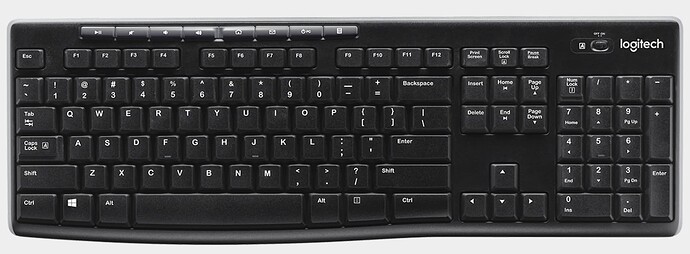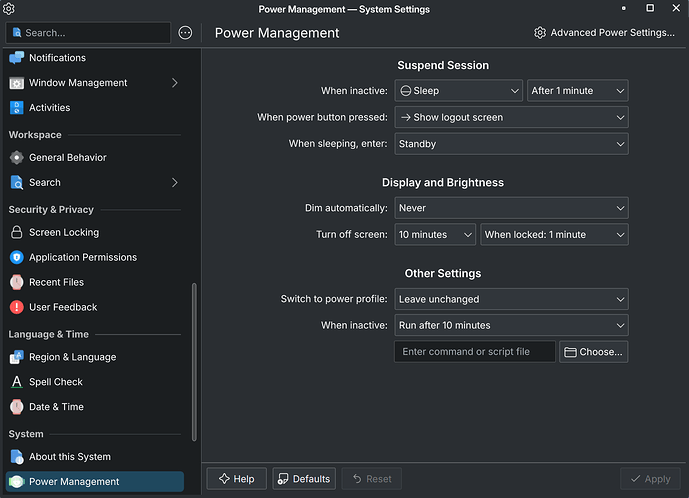So there seem to be quite a few threads on the subject. Most seem PC/system-specific. I’m going to assume this is Nvidia related? I’ve tried every possible combination of settings via System Settings > Power Management and Screen Locking. Whatever the choice, when waking, the monitor starts to wake and goes right back into sleep/stand-by. I have to hold the power button for a hard reboot.
PC Specs:
- MB: MSi Z370 GAMING M5
- PSU: Corsair CX750M (750 Watt)
- CPU: Intel i7-8700k @ 3.7GHz
- GPU: ZOTAC Nvidia GeForce RTX 3060 Ti
- Ram: 32GB Crucial Pro DDR4-3200 UDIMM (2x16GB)
- Storage: Samsung 960 EVO 500 GB NVMe M.2 SSD
- Storage: Crucial P310 1 TB NVMe M.2 SSD
Boot Log HERE.
inxi -Fxxc0z ![]()
❯ inxi -Fxxc0z
System:
Kernel: 6.14.3-arch1-1 arch: x86_64 bits: 64 compiler: gcc v: 14.2.1
Desktop: KDE Plasma v: 6.3.4 tk: Qt v: N/A wm: kwin_wayland dm: SDDM
Distro: EndeavourOS base: Arch Linux
Machine:
Type: Desktop System: Micro-Star product: MS-7B58 v: 1.0
serial: <superuser required>
Mobo: Micro-Star model: Z370 GAMING M5 (MS-7B58) v: 1.0
serial: <superuser required> UEFI: American Megatrends v: 1.B0
date: 07/10/2024
Battery:
Device-1: hidpp_battery_0 model: Logitech Wireless Keyboard serial: <filter>
charge: 55% (should be ignored) status: discharging
CPU:
Info: 6-core model: Intel Core i7-8700K bits: 64 type: MT MCP
arch: Coffee Lake rev: A cache: L1: 384 KiB L2: 1.5 MiB L3: 12 MiB
Speed (MHz): avg: 800 min/max: 800/4700 cores: 1: 800 2: 800 3: 800 4: 800
5: 800 6: 800 7: 800 8: 800 9: 800 10: 800 11: 800 12: 800 bogomips: 88796
Flags: avx avx2 ht lm nx pae sse sse2 sse3 sse4_1 sse4_2 ssse3 vmx
Graphics:
Device-1: NVIDIA GA104 [GeForce RTX 3060 Ti Lite Hash Rate] vendor: ZOTAC
driver: nvidia v: 570.144 arch: Ampere pcie: speed: 5 GT/s lanes: 16 ports:
active: none off: HDMI-A-1 empty: DP-1,DP-2,DP-3 bus-ID: 01:00.0
chip-ID: 10de:2489
Display: wayland server: X.org v: 1.21.1.16 with: Xwayland v: 24.1.6
compositor: kwin_wayland driver: X: loaded: nvidia unloaded: modesetting
alternate: fbdev,nouveau,nv,vesa gpu: nvidia,nvidia-nvswitch display-ID: 0
Monitor-1: HDMI-A-1 model: Samsung Smart M70D res: 3840x2160 hz: 60
dpi: 140 diag: 801mm (31.5")
API: EGL v: 1.5 platforms: device: 0 drv: nvidia device: 1 drv: nouveau
device: 2 drv: swrast gbm: drv: nvidia surfaceless: drv: nvidia wayland:
drv: nvidia x11: drv: nvidia
API: OpenGL v: 4.6.0 compat-v: 4.5 vendor: nvidia mesa v: 570.144
glx-v: 1.4 direct-render: yes renderer: NVIDIA GeForce RTX 3060 Ti/PCIe/SSE2
display-ID: :1.0
API: Vulkan v: 1.4.309 surfaces: xcb,xlib,wayland device: 0
type: discrete-gpu driver: nvidia device-ID: 10de:2489
Info: Tools: api: clinfo, eglinfo, glxinfo, vulkaninfo
de: kscreen-console,kscreen-doctor gpu: nvidia-settings,nvidia-smi
wl: wayland-info x11: xdpyinfo, xprop, xrandr
Audio:
Device-1: Intel 200 Series PCH HD Audio vendor: Micro-Star MSI
driver: snd_hda_intel v: kernel bus-ID: 00:1f.3 chip-ID: 8086:a2f0
Device-2: NVIDIA GA104 High Definition Audio vendor: ZOTAC
driver: snd_hda_intel v: kernel pcie: speed: 8 GT/s lanes: 16
bus-ID: 01:00.1 chip-ID: 10de:228b
API: ALSA v: k6.14.3-arch1-1 status: kernel-api
Server-1: PipeWire v: 1.4.2 status: active with: 1: pipewire-pulse
status: active 2: wireplumber status: active 3: pipewire-alsa type: plugin
4: pw-jack type: plugin
Network:
Device-1: Qualcomm Atheros Killer E2500 Gigabit Ethernet
vendor: Micro-Star MSI driver: alx v: kernel pcie: speed: 2.5 GT/s lanes: 1
port: d000 bus-ID: 04:00.0 chip-ID: 1969:e0b1
IF: enp4s0 state: up speed: 1000 Mbps duplex: full mac: <filter>
Drives:
Local Storage: total: 1.36 TiB used: 376.61 GiB (27.0%)
ID-1: /dev/nvme0n1 vendor: Crucial model: CT1000P310SSD8 size: 931.51 GiB
speed: 63.2 Gb/s lanes: 4 serial: <filter> temp: 38.9 C
ID-2: /dev/nvme1n1 vendor: Samsung model: SSD 960 EVO 500GB
size: 465.76 GiB speed: 31.6 Gb/s lanes: 4 serial: <filter> temp: 38.9 C
Partition:
ID-1: / size: 421.54 GiB used: 94.71 GiB (22.5%) fs: ext4
dev: /dev/nvme1n1p2
Swap:
ID-1: swap-1 type: partition size: 34.41 GiB used: 0 KiB (0.0%) priority: -2
dev: /dev/nvme1n1p3
Sensors:
System Temperatures: cpu: 45.0 C mobo: N/A
Fan Speeds (rpm): N/A
Info:
Memory: total: 32 GiB available: 31.28 GiB used: 3.98 GiB (12.7%)
Processes: 319 Power: uptime: 14m wakeups: 0 Init: systemd v: 257
default: graphical
Packages: pm: pacman pkgs: 1374 Compilers: clang: 19.1.7 gcc: 14.2.1
Shell: fish v: 4.0.2 running-in: kitty inxi: 3.3.38
❯
It’s not the end of the world. I have no problem shutting down each night before bed, or when I’m away from the PC. Just curious if there may be something I can do here to rectify this.
Too bad there’s no screensaver for Wayland.

